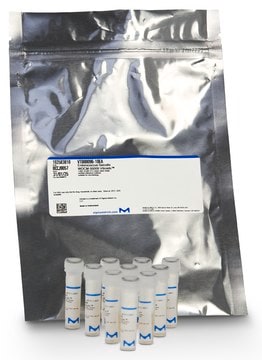CRM07464M
Bacillus cereus NCTC 7464 Lenticule® discs
500-50000 CFU, suitable for microbiology, certified reference material, Manufactured by: Sigma-Aldrich Production GmbH, Switzerland
Synonym(s):
B. cereus NCTC 7464 Lenticule® discs, Bacillus cereus NCTC 7464 Lenticule® discs, Certified reference material, Microbiological standards
About This Item
Recommended Products
grade
certified reference material
Quality Level
Agency
ISO 17034
ISO/IEC 17025
form
disc (hydrosoluble)
solid
shelf life
limited shelf life, expiry date on the label
packaging
pack of 10
manufacturer/tradename
Manufactured by: Sigma-Aldrich Production GmbH, Switzerland
application(s)
environmental
food and beverages
microbiology
storage temp.
−20°C
suitability
Bacillus cereus
Bacillus spp.
Looking for similar products? Visit Product Comparison Guide
General description
Application
Features and Benefits
- Ready-to-use at convenient CFU ranges
- No dilution required
- Quick rehydration in 10 minutes
- At least 16 months of shelf life in a standard -20 °C freezer
- Complete with a comprehensive certificate of analysis
- No maintenance of stock cultures
- No recovery time or pre-enrichment step is necessary
- Robust, efficient, and reliable
- Easy-to-use
- Cost-effective
Other Notes
Other cell culture collections:
- DSM 9378
- ATCC® 10876
- CECT® 131
Legal Information
Storage Class Code
11 - Combustible Solids
WGK
WGK 3
Certificates of Analysis (COA)
Search for Certificates of Analysis (COA) by entering the products Lot/Batch Number. Lot and Batch Numbers can be found on a product’s label following the words ‘Lot’ or ‘Batch’.
Already Own This Product?
Find documentation for the products that you have recently purchased in the Document Library.
Customers Also Viewed
Related Content
Explore certified microbiological reference materials: VITROIDS™, LENTICULE® discs by Millipore®. Ideal for food, beverage, cannabis testing. Order today.
Our team of scientists has experience in all areas of research including Life Science, Material Science, Chemical Synthesis, Chromatography, Analytical and many others.
Contact Technical Service

